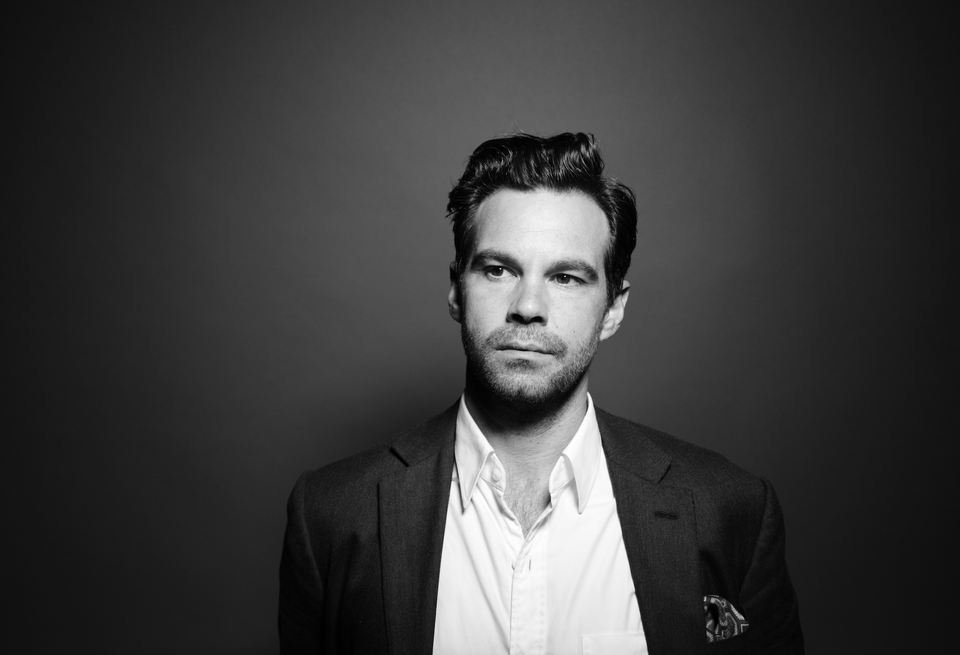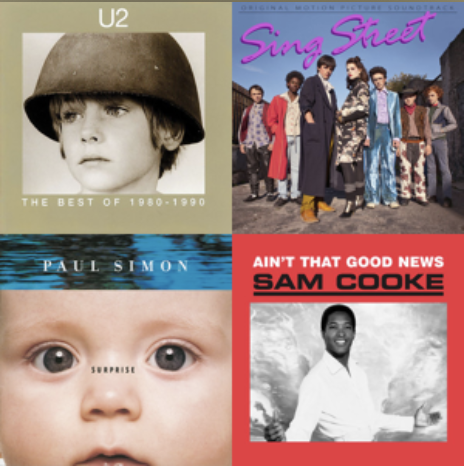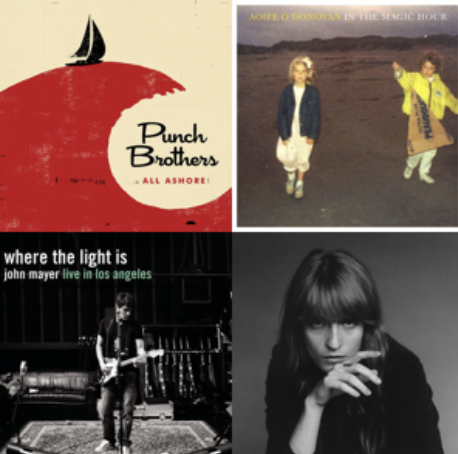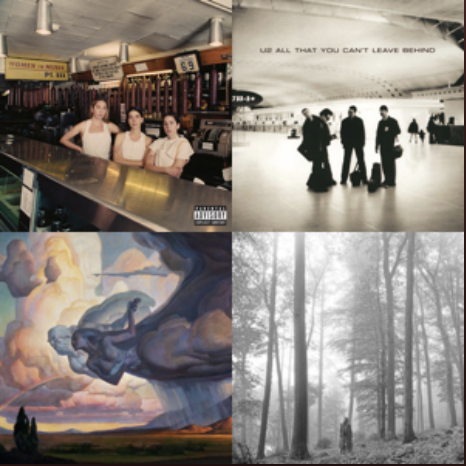I’m not alone in this, but I feel like there’s never enough time — to get everything done, to read the stack of books at my bedside, to enjoy the company of my wife and children. But is time merely a construct, or is it somehow a character in my life, perhaps even with its own agency? In “Time’s Always Leaving,” a song by Nashville-based The Lone Bellow, time appears as an antagonist.
Time’s always leaving, heading out my door
Saying goodbye, pacing my floor
I can’t seem to tell her, but I wish she would stay
Time’s always leaving, let her go on her way
Time’s always leaving, never takes off her coat
Packing her bags, never leaving a note
The band has recorded a few musically distinct versions of the song, each one pointing to a different way of responding to time’s theft. The original recording has a punchy, defiant sound. The band’s live performances push that defiant feeling further. But last fall, the band released a new version of the song where the sound invites, instead of defiance, melancholy.
I spoke to Zach Williams, the band’s lead singer and primary songwriter, about the two sides of “Time’s Always Leaving.” He told me the tune began — as the band’s often do — in a poetic journal entry. “It’s like that age-old battle with time, feeling like it’s slipping away and just trying to come to grips with it,” Williams said. “You feel or see something beautiful and you don’t want to let it go, and then time’s just kind of the villain.”
Known for their harmonies, the band delivers a standout musical moment early in the song, when Zach, Brian Elmquist and Kanene Pipkin’s voices join forces for the first time.
Seems I’m always believing she’ll stay for the night
Time’s always leaving
Before I can tell her to stay, stay
“We wanted the voices to come in at the first part of the song where you’re begging for time to do something,” Williams said. “I was like, ‘Let’s all come in on ‘stay.’”
I remember hearing the song for the first time, already tapping my feet, nodding my head, and then — liftoff. The song’s punchy melody fits with what Williams describes as “a really upbeat kind of rock and roll, almost a Sam Cooke kind of vibe.” On that first listen, I was having such a good time I hadn’t absorbed the depth of the words Williams and his bandmates belted out.
Williams told me he’s been inspired by something “country music has done well over the decades, especially old Willie Nelson songs and stuff like that — the people that need to hear the lyrics, they will hear them.” He continued: “The people that don’t necessarily need to hear them, they just won’t hear the lyrics. They’ll just hear the backbeat and the melody.”
The Lone Bellow’s live shows are a communal experience, a focus of their intention. And so Williams is glad to deliver, in both word and sound, whatever it is an audience member needs: “I really feel like we’re kind of in the service industry as musicians. I’m grateful for it.”
When the band first started playing “Time’s Always Leaving” on tour, they added to its energy. Williams told me, “A natural thing that happens with us is, as we play new songs to people… there’s this back and forth that happens. We’ll end up doing something [musically] on the fly at one live show and then we’ll miss it the next [time] and want to do it again, and then it starts becoming a part of the song.”
The band also dialed up the immediacy of the lyrics: “We started speeding the tempo at the end to give [the song] a feeling that time was going away, you know? So the recording doesn’t have that, but then the live thing does.” The acceleration is thrilling to behold in person — before it vanishes like time itself.
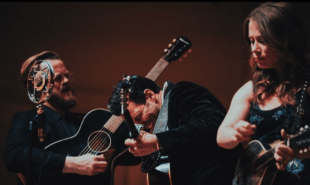
After supporting Walk Into a Storm, the band expanded a staple of its live show — a short set around a single mic — into a full tour of its own, called TRIIIO. The band also recorded a stripped-down new EP, The Restless, in conjunction with the tour.
The Restless puts the vocals front and center, alongside organic touches from hand claps to foot stomps. “We wanted to keep it pretty sparse,” Williams said. “We basically only banged on things that were actually in the room.”
The EP’s first track is an all-new arrangement of “Time’s Always Leaving,” which begins with environmental sounds that draw you into the room and light percussion that comes in like a muted heartbeat — “Brian with his shoe off and a sock pounding on the floor of the attic” of Jason and Kanene Pipkin’s house, where they recorded.
I asked how they chose “Time’s Always Leaving,” for the EP. Williams said, “I knew that we would have to figure out how to play these songs live and figure out what’s the most powerful way to do those. So we ended up reworking a lot of the songs and that one really popped out.” The result offers a dramatic shift in tone — no more hiding time’s power or effects.
This more melancholy sound found me at a time when I needed to find the lyrics. My older daughter had started high school and was learning to drive. My younger daughter had started middle school and was learning more about who she is. And our whole family was preparing for a kind of loss, as the little boy who’d been living with us for nearly a year was soon to be reunited permanently with his mom. It was a reunion we’d prayed to see, but even so, counting the days we had left together was bittersweet.
I’m not through with her yet
I’m afraid of the morning, morning
And I dread the sunset
“We were like, let’s let the lyrics just fall where they may,” Williams said. “It’s funny because when you listen to the original recording it’s, ‘Oh, this is a happy song.’ Then when you listen to the [newer version] you’re like, ‘This is not a very happy song.’” To let gravity have its way with the words, Williams told the band, “We should write a different melody to this.”
“Time” wasn’t the only tune where that happened. In “Emotional,” the band emphasizes and draws out a chorus — “wish I was gone, wish I was dust” — that brings a cold chill. Williams described how pulling layers off of a song transforms the music: “When you, not necessarily slow it down, but when you pull out the other instrumentation, and you’re just sitting on the lyrics, you want to see if it will form into a new life.”
Williams told me the name of the band’s first tour, “Take My Ink and Take My Blood,” was pulled from “Emotional,” a song emerging from a sense of “betrayal and complete heartache, and then trying to find the other side of that — the side of grief that’s not maybe touched on as much, where you just go numb. And that’s where the ‘you can be all kinds of emotional’ part comes in, where you’re just kind of in survival mode.”
###
I spent weeks spinning The Restless — on my 25-minute drive to middle school each morning, while sitting in the passenger seat watching my older daughter’s independence take the wheel, and finally after a joyful-but-gutting goodbye with the little boy we love. Just a few days later, my wife and I travelled to Nashville for a weekend together. We saw The Lone Bellow perform a full-band show at Basement East, where they brought “Time’s Always Leaving” full circle, back to its defiant roots, rebelling against time’s heists.
Time’s always leaving, sneaking peeks at her watch
Always whispering sweet little lies ’bout her thoughts
Always saying everything’s gonna be alright
But time and time again, I give up the fight
And tell her to stay, stay
Williams saw the shift, too. “For sure,” he said. “Especially, Julian Dorio on the drums just has this ability to like smash his heart into the snare. On that song when he gets faster and faster at the end, you can feel that defiance coming through.”
That wasn’t his plan for the show: “I had gotten so hooked on what that song felt like at our TRIIIO show, but that’s a beautiful thing about being in a band. I think Brian and Jason really wanted to go back to just like slamming it down.”
Noticing how the music changed, or at least opened up, the lyrics is what first led me to reach out to Williams. Over the course of our conversation, he spoke earnestly about his family. His wife’s family is from Lafayette, Georgia, and his parents fell in love on top of Lookout Mountain — whose eastern brow rises across from my own front porch.
I asked how he, as a father, approaches that villain, time. What does it look like to seize the day and make memories, and what does it feel like to dread the sunset?
“The situation I’m in is different than the way I grew up. I grew up in a family where my dad had like a nine-to-five, got-home-at-six kind of thing. Which is great. In the situation that I’m in, when I’m home, I’m home. I have great time with my family, and when I’m gone I’m really gone. I mean, I’ll call home and stuff, but the kids, they don’t want to talk that long on the phone. They’ve got other things that they want to do. I’ll write them letters and stuff.”
Williams was just a couple weeks into being home again, following a tour that ended with a three-night stand in New York City, where The Lone Bellow began playing together years ago as a “Brooklyn country” band. He’s been writing new songs, and the band plans to enter the studio again soon to record their next album. In the meantime, Williams is trying to manage the demands on his time.
“It’s a thing that every parent wrestles with,” he said. “Trying to find that balance… Maybe you’re fortunate to be able to do work that you love, or maybe you’re in a situation where you just do your work and then you shut it off, and then you come home. Then you come back to the life that you love — just trying to find that wonder in it all. I feel like it gets harder and harder as you get older.”
Williams said his eight-year-old in particular shares an artistic bent. Despite the fact it takes him away from home, “She’s already just really encouraging about the work that I get to do,” he said. “So that’s been a beautiful thing.” But being on the road has its costs: “When [the kids are] young, you just feel bad all the time.”
Working with younger artists, though, offers a warm glimpse of the future.
Williams recounted meeting with a Nashville musician who’s preparing to launch her debut album. “She encouraged me,” he said. “She was like ‘Hey, my dad was gone all the time and he felt real bad about it, but even as a kid I knew that when he was home, he was home. Knowing that dad was out doing something that he loved that just carried me through the times that he was gone.’”
Oh, time won’t you stay?
You’re all I’ve got left
I’m a man on my knees
Begging you please
If you just have to leave
Oh, take with you my regrets
To that — whether I’m punching a fist into the air or wiping a tear from my cheek — I can only add, “Amen.”

